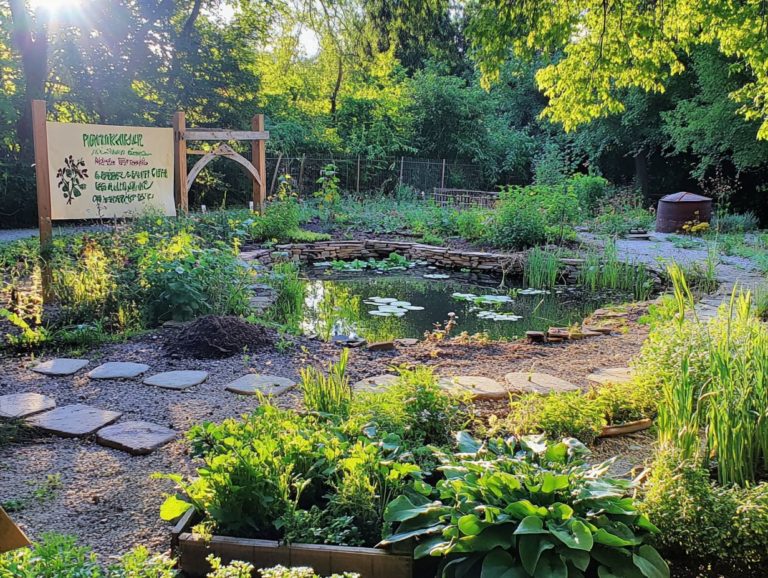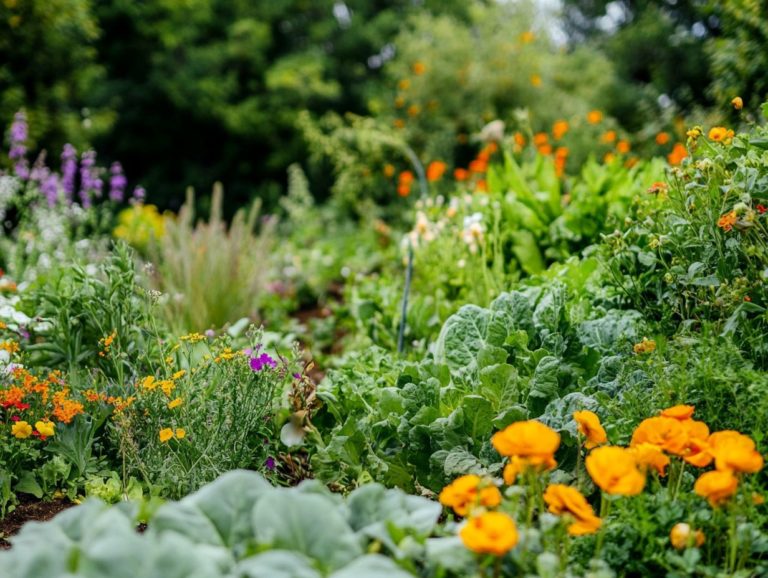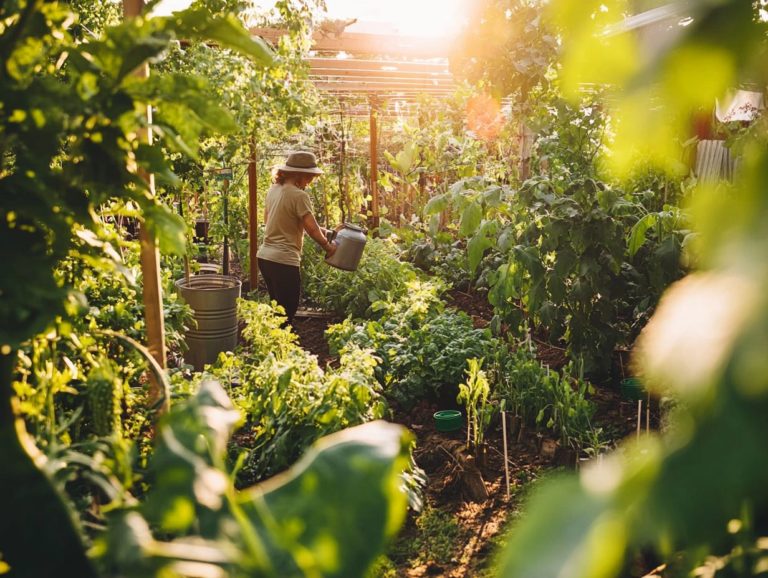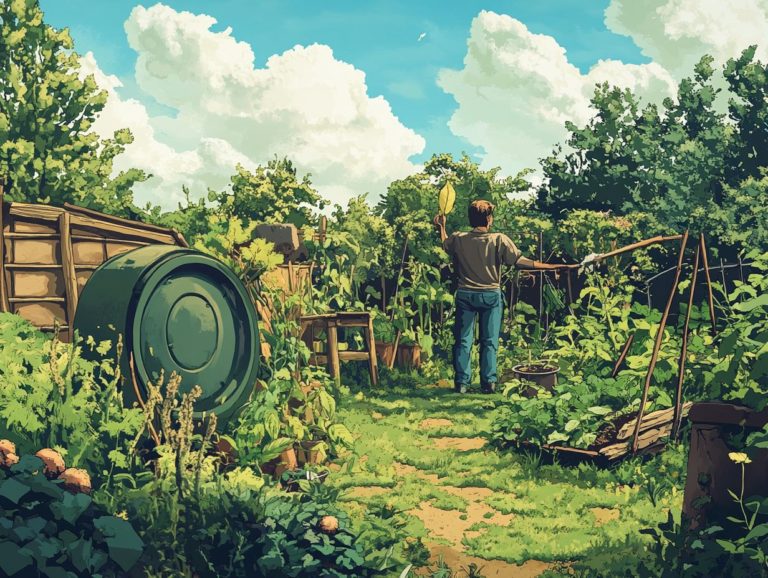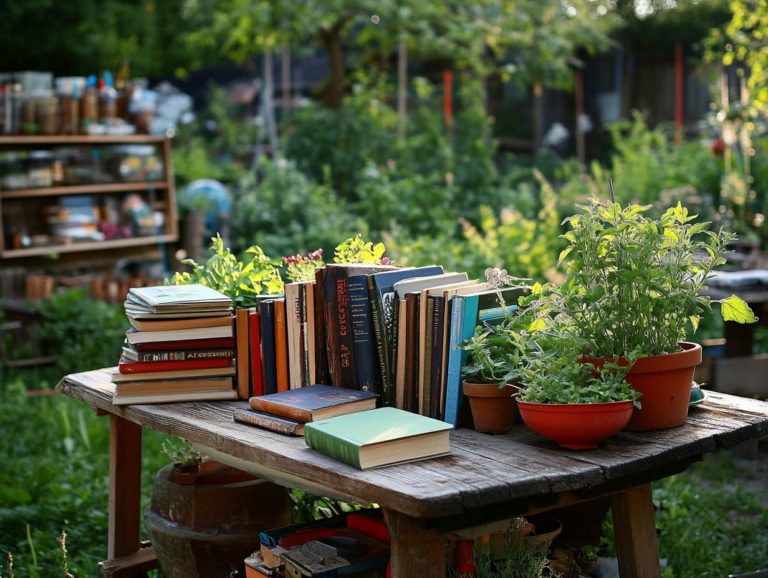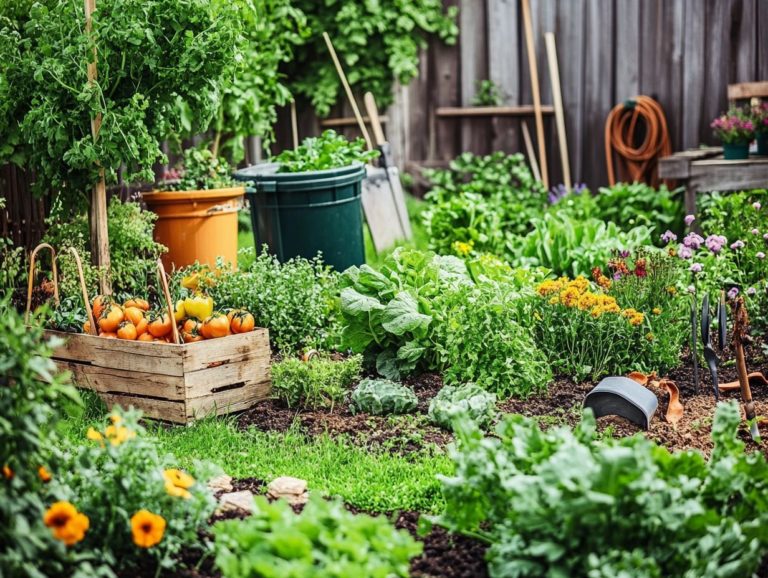How to Deal with Weeds in Permaculture Gardening?
Weeds often receive an undeserved reputation in gardening. In the realm of permaculture, their role is far more nuanced than one might assume.
This discussion delves into the dual nature of weeds, weighing their advantages against their disadvantages. You ll learn how to identify various types of weeds, explore effective control methods, and discover proactive strategies to prevent them from overtaking your garden.
You will uncover innovative ways to transform these often-maligned plants into valuable resources for your garden.
Dive in and unlock the hidden potential of weeds on your permaculture journey!
Contents
- Key Takeaways:
- The Role of Weeds in Permaculture Gardening
- Identifying and Classifying Weeds
- Controlling and Managing Weeds
- Preventing Weeds in Permaculture Gardens
- Using Weeds as a Resource in Permaculture
- Frequently Asked Questions
- What is permaculture gardening and why is it important to deal with weeds?
- How can I prevent weeds from taking over my permaculture garden?
- Should I use herbicides to control weeds in my permaculture garden?
- What are some effective organic methods for dealing with weeds in permaculture gardening?
- Can weeds be beneficial in permaculture gardening?
- What should I do with the weeds I remove from my permaculture garden?
Key Takeaways:
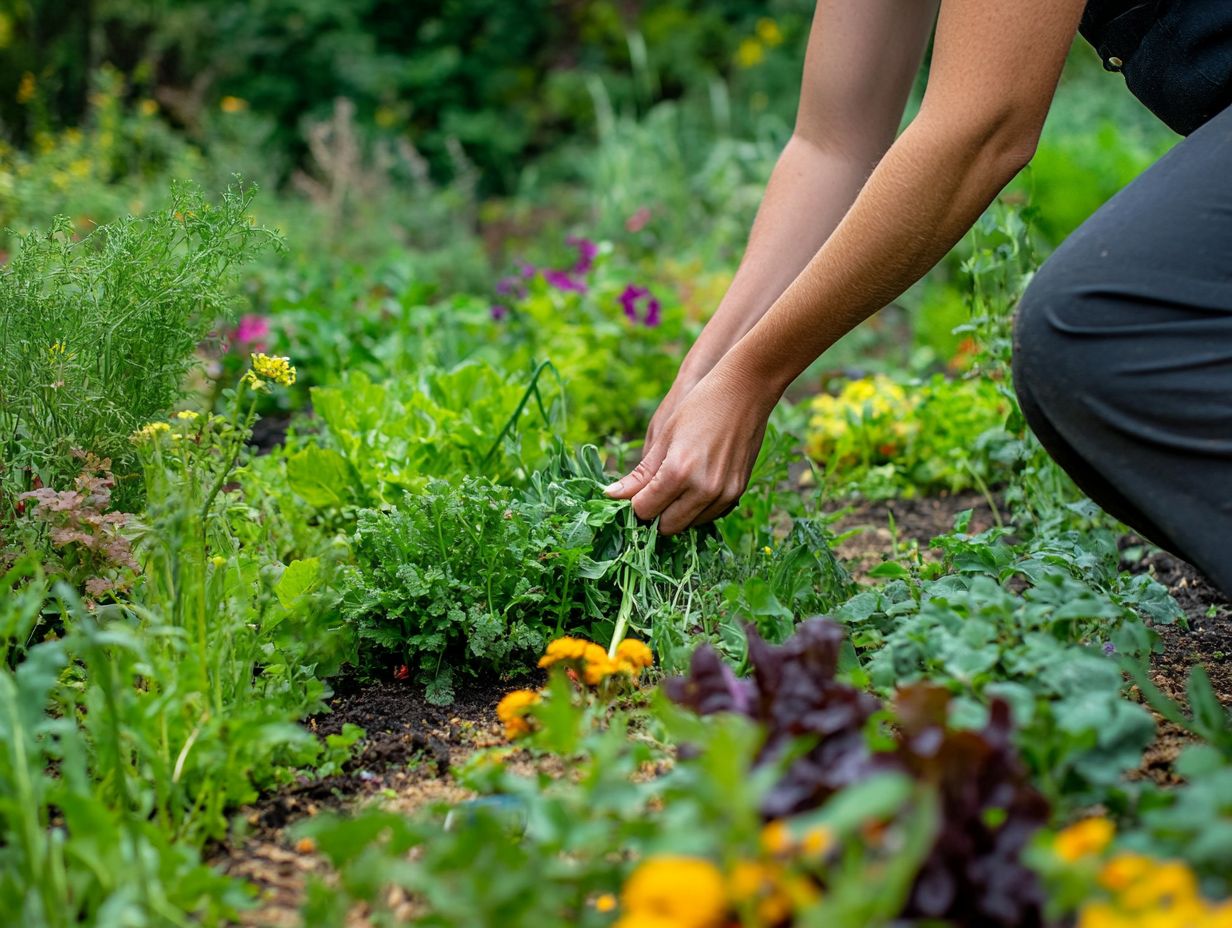
- Weeds can nourish the soil but might compete for resources.
- Identifying weeds is crucial for effective management.
- Natural weed control methods like mulching are sustainable choices.
The Role of Weeds in Permaculture Gardening
Weeds occupy a complex position in permaculture gardening, acting as both allies and adversaries within the garden ecosystem. While they can enhance soil health through improved nutrient cycling and increased biodiversity, certain species can become invasive, vying for resources alongside your cherished plants.
Understanding this dual nature of weeds is essential for achieving gardening success, especially in urban lots where space and soil quality may be constrained. By employing techniques like composting and strategically utilizing organic materials, you can harness the beneficial aspects of weeds while effectively managing their growth.
Benefits and Drawbacks of Weeds
Let s explore the good and the bad about weeds in your garden. Weeds can bring a mix of benefits and drawbacks to your permaculture garden, significantly influencing soil health and overall biodiversity.
These resilient plants often play a crucial role in soil aeration, enhancing water infiltration and promoting root growth, which is vital for maintaining a thriving ecosystem. Certain edible weeds can serve as a forage source for both animals and humans, adding delightful diversity to your diet.
However, it’s essential to acknowledge that some weeds can become invasive, outcompeting the plants you want and throwing your garden’s balance off-kilter. Effective weed control becomes key in managing their growth, ensuring that their benefits don t overshadow their potential to create chaos.
Understanding these plants helps you make smart choices in your garden!
Identifying and Classifying Weeds
Identifying and classifying weeds is crucial for mastering effective weed management in permaculture gardening. This knowledge enables you to distinguish between harmful invasive species and beneficial plant indicators within your ecosystem, enhancing the overall health and productivity of your garden.
Types of Weeds and Their Characteristics
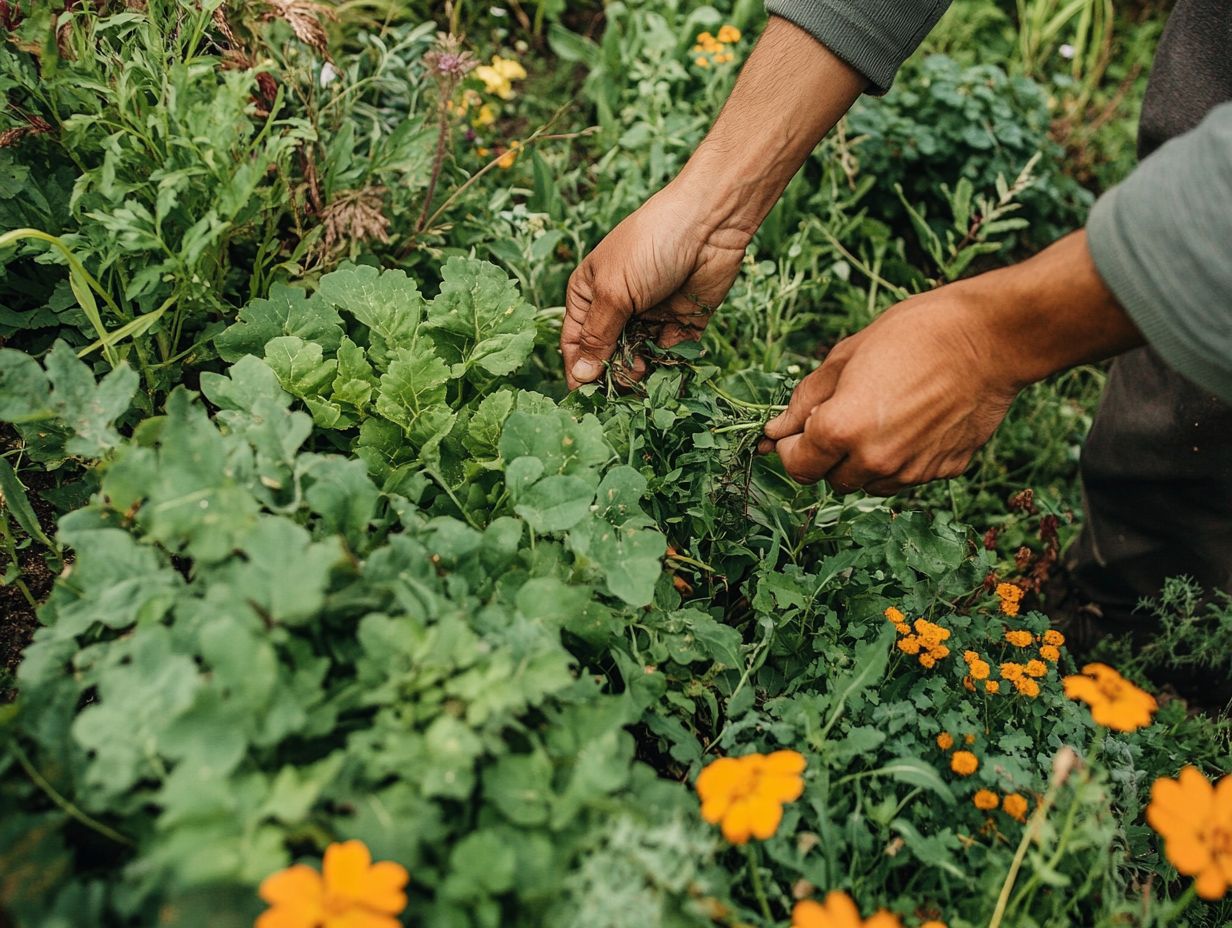
Understanding the various types of weeds, like Dandelion, Thistle, and Bindweed, along with their unique characteristics, is essential for effective weed management in your garden.
These plants thrive in a range of environments and display fascinating growth patterns that can either bolster or disrupt the delicate balance of garden ecosystems. Take Dandelions, for example; their main root grows deep into the soil to find nutrients, enhancing aeration and nutrient availability.
In contrast, Thistles come equipped with spiny leaves and deep roots, competing fiercely for resources and potentially overshadowing the more desirable plants you ve nurtured.
Then there s Bindweed. Often labeled a persistent nuisance, it has the ability to cover unsightly areas, functioning like a natural mulch that can help retain soil moisture. However, its aggressive growth can choke out native flora, making it crucial for you to understand its role in your garden.
Knowledge is power, after all, and recognizing these dynamics will elevate your gardening game!
Controlling and Managing Weeds
Implement effective weed control and management strategies. This boosts the health of your permaculture garden. By using natural solutions and targeted practices, you can significantly enhance plant health and productivity.
Natural and Chemical Methods
You can choose between natural solutions and chemical methods for weed control. Each option has implications for soil health and overall ecosystem balance.
Natural methods, like mulching and using organic herbicides, enhance soil structure and promote beneficial organisms. This fosters biodiversity, which chemical treatments often disrupt. In contrast, chemical herbicides deliver quick results but may lead to long-term soil degradation and harm non-target species, creating an imbalanced ecosystem.
Using organic gardening methods helps your plants thrive naturally. The choice you make will have lasting effects on soil vitality and the intricate web of life that depends on it.
Preventing Weeds in Permaculture Gardens
Keep weeds at bay in your permaculture garden with smart, proactive strategies. By incorporating elements like ground cover and organic mulch, you can effectively suppress weed growth and create a thriving ecosystem. Additionally, learning how to use perennials in your permaculture garden can further enhance your garden’s resilience with minimal intervention.
Strategies for Weed Prevention
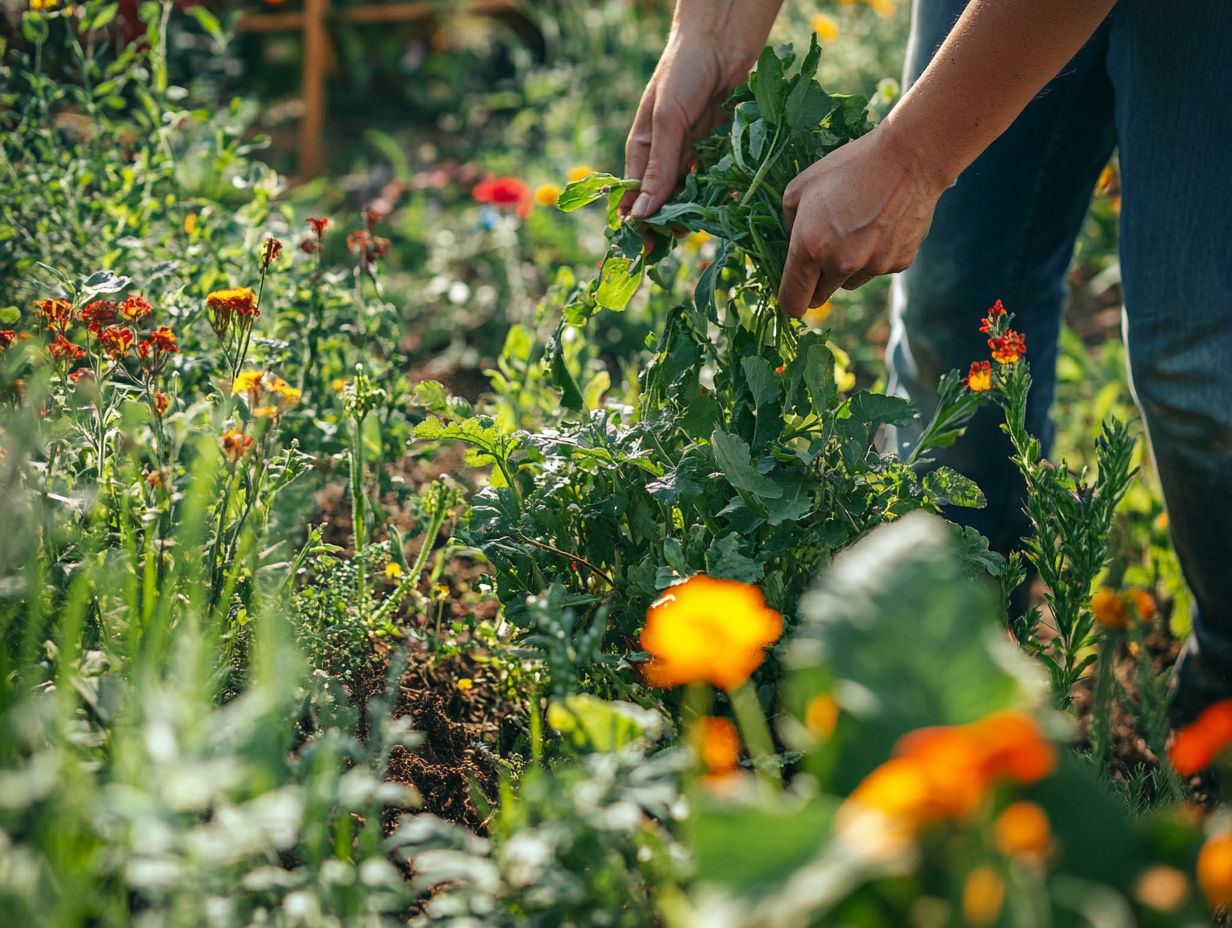
Implementing effective strategies for weed prevention, such as using cover crops and organic materials, can enhance soil structure and reduce competition from pesky weeds.
By incorporating diverse cover crops, you can boost soil fertility while keeping unwanted plants at bay. These crops shield your soil from erosion and enrich it with organic matter, essential for optimal growth.
Utilizing organic materials like compost provides key nutrients that nourish your desired crops. This proactive approach creates a balanced ecosystem where plants flourish and weeds struggle to establish themselves, resulting in healthier gardens and more bountiful harvests.
Try these tips today for a healthier, more productive garden!
Using Weeds as a Resource in Permaculture
Instead of seeing weeds as bothersome intruders, recognize their potential as valuable assets in your permaculture garden. By harnessing their capabilities, you can transform them into compost, enhance biodiversity, and even incorporate edible varieties through companion planting (growing different plants together to benefit each other).
Creative Ways to Utilize Weeds
Creative ways to utilize weeds include composting, harvesting edible varieties, and attracting beneficial wildlife. All these methods significantly enhance the nutrient levels and overall health of your garden.
Consider this: instead of viewing dandelions and clover as pesky intruders, think of them as culinary treasures. You can harvest these plants for use in salads or teas, enriching your diet with essential nutrients. Some weeds, like nettles, can even be steeped to create a nutrient-rich liquid fertilizer that boosts plant growth.
Leaving certain weed species in place can attract pollinators and wildlife, fostering a balanced ecosystem that encourages natural pest control. By thoughtfully integrating these often-overlooked plants, you can transform your garden into a vibrant hub of life and sustainability.
Frequently Asked Questions
- What are the best natural methods for weed control?
- How can I use weeds to enhance my garden’s health?
- What are cover crops, and how do they help prevent weeds?
What is permaculture gardening and why is it important to deal with weeds?
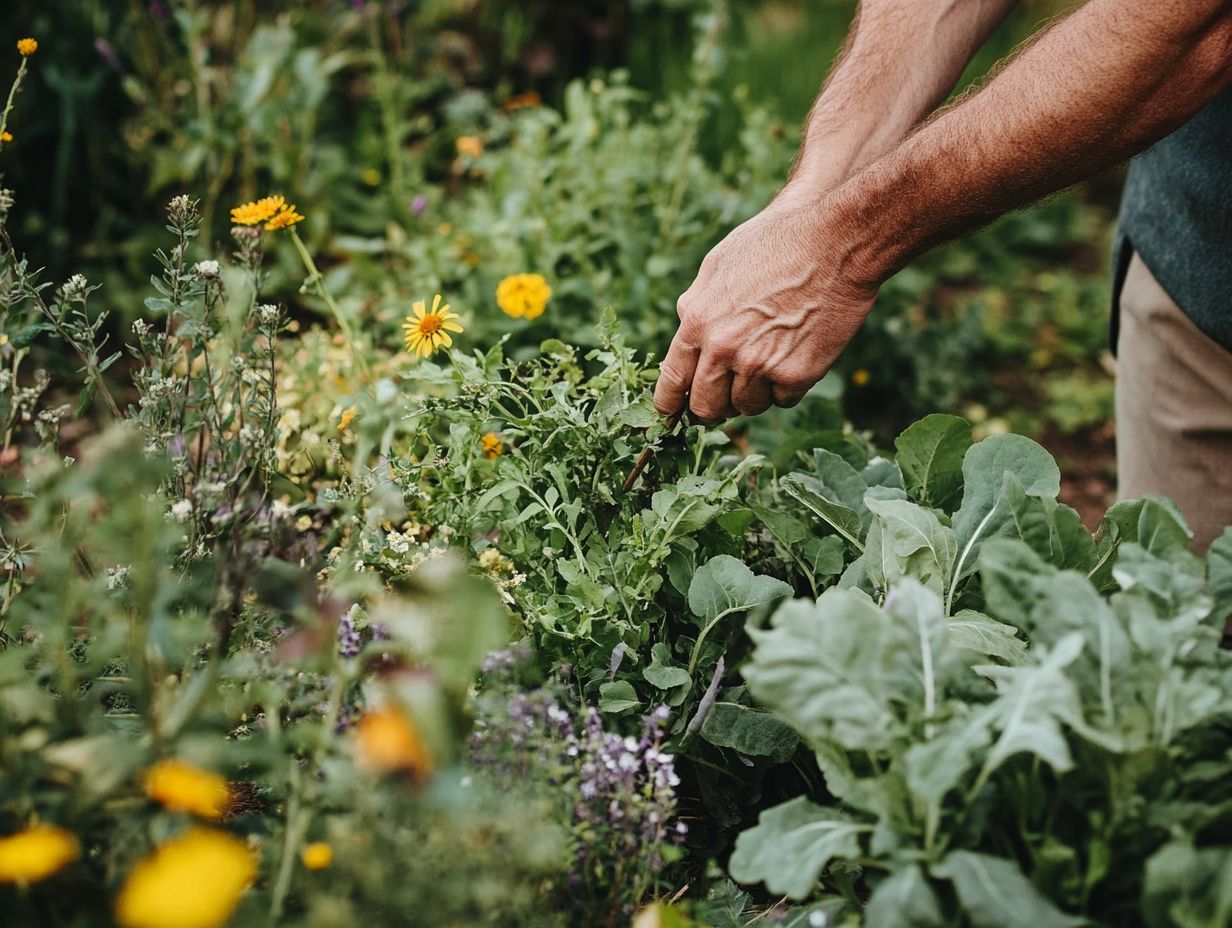
Permaculture is a sustainable gardening method that imitates nature. Weeds compete with plants for resources. It’s crucial to manage them in permaculture gardens.
How can I prevent weeds from taking over my permaculture garden?
Healthy soil prevents weeds. Maintain a balance of nutrients and organic matter to support your plants.
Use mulch and ground cover plants to suppress weed growth.
Should I use herbicides to control weeds in my permaculture garden?
No, the use of herbicides is not recommended in permaculture gardening. Herbicides are chemicals used to kill unwanted plants and can harm beneficial plants and insects. They disrupt the natural balance of your garden and contribute to pollution.
Instead, explore effective organic methods for managing weeds that align with permaculture principles.
What are some effective organic methods for dealing with weeds in permaculture gardening?
There are several methods for managing weeds organically, including hand-pulling, hoeing, and using a flame weeder. You can also create a weed barrier with landscaping fabric or cardboard covered with mulch.
In permaculture gardening, addressing the root cause of weed growth is essential rather than simply removing them.
Can weeds be beneficial in permaculture gardening?
Yes, some weeds can serve a beneficial purpose. Certain types indicate soil deficiencies and help break up compacted soil. They can attract pollinators and provide habitat for beneficial insects.
However, it is important to properly identify and manage these weeds to prevent them from becoming invasive.
What should I do with the weeds I remove from my permaculture garden?
Properly dispose of weeds to prevent them from reseeding or spreading. Avoid composting weeds that have gone to seed, as the seeds may survive and spread in your garden.
Instead, dispose of them in a green waste bin or leave them to dry out in the sun before adding them to your compost pile.

